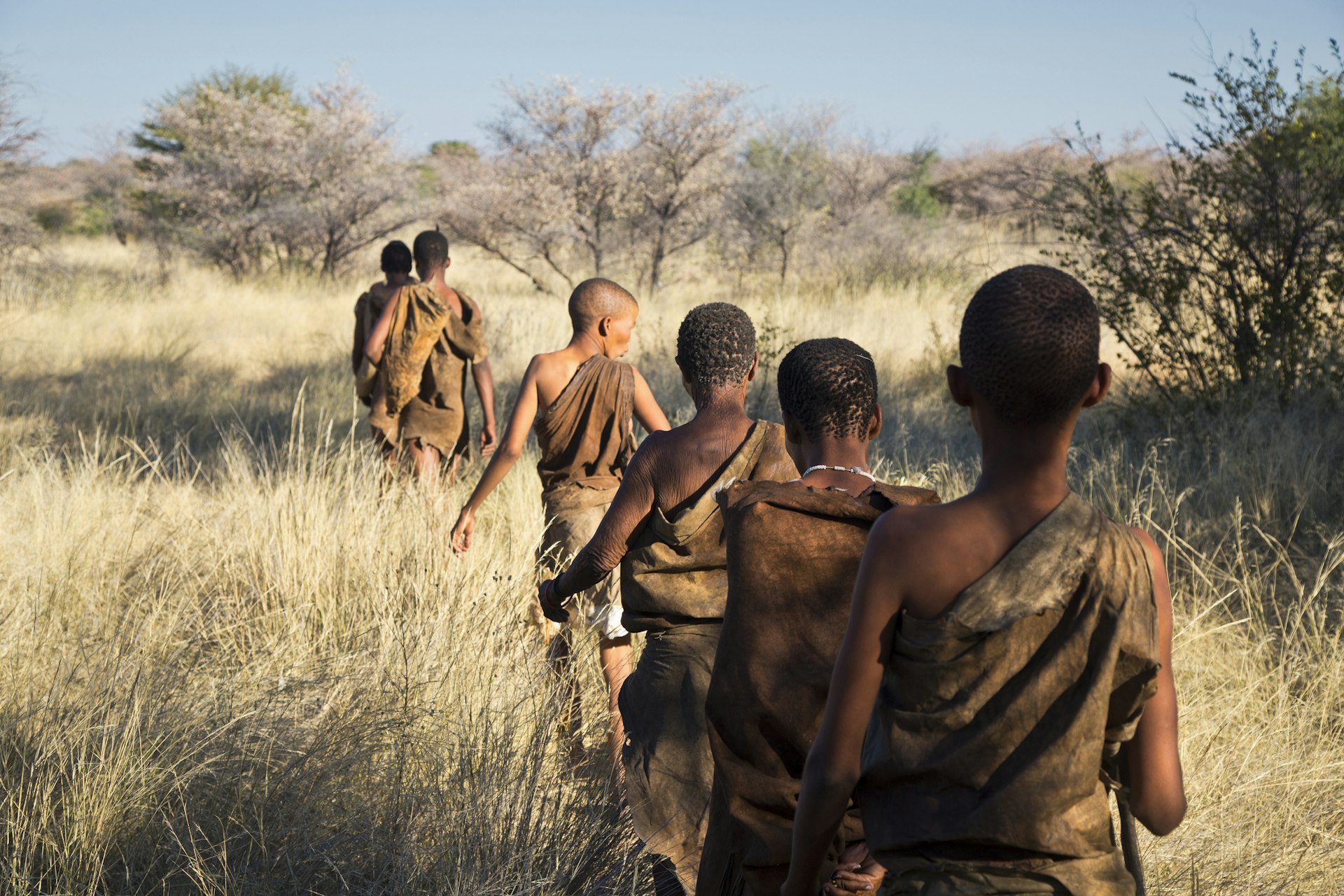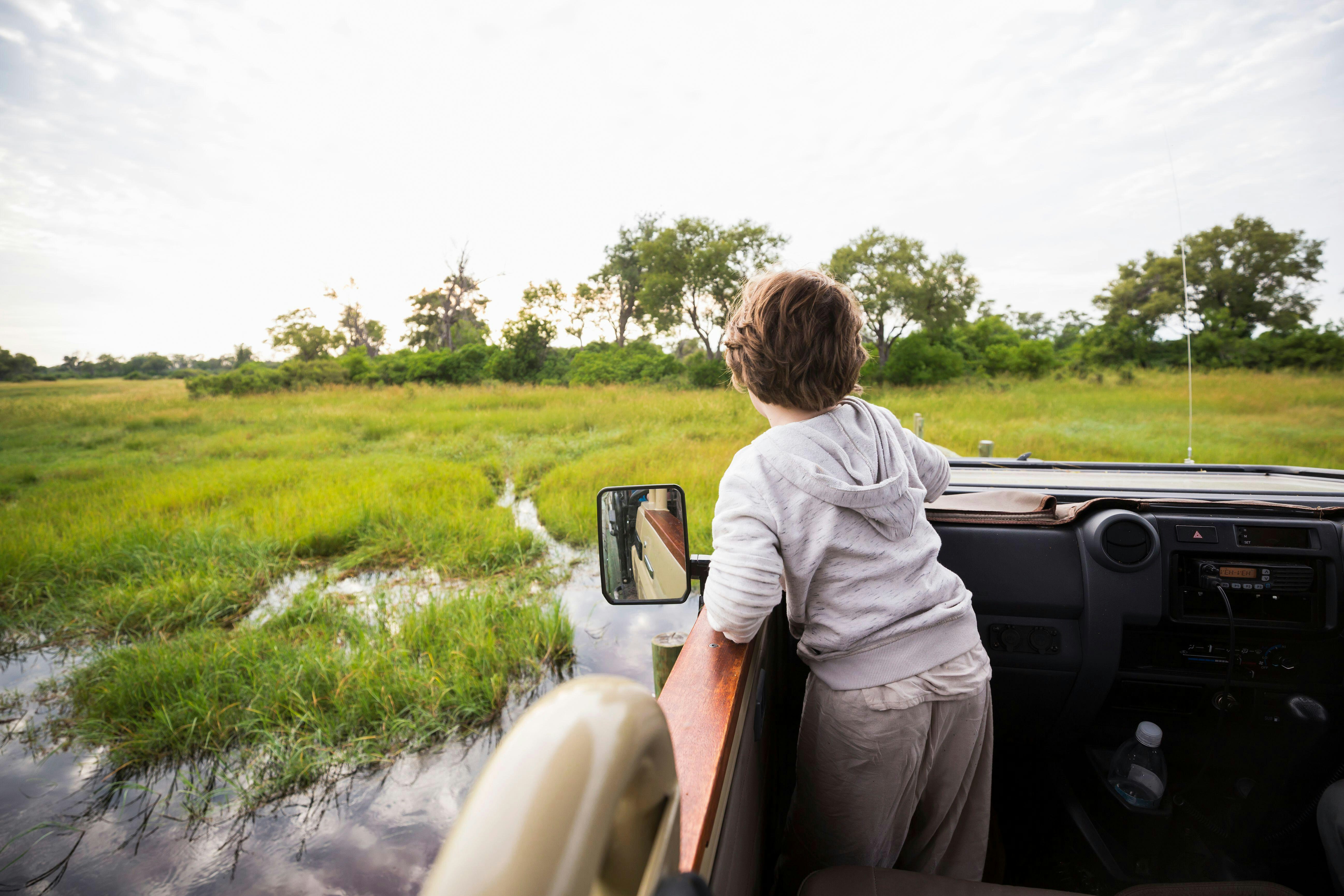Botswana makes for a memorable trip with kids. From quad biking across Makgadikgadi Salt Pans to encounters with elephants, lions, and giraffes, few countries can match it for variety.
It doesn’t matter if you’re on a multigenerational safari, a self-drive adventure, or simply camping beneath the stars, its vast, unspoiled landscapes serve as a playground for young explorers. Here’s how to visit Botswana with kids.
Is Botswana good for kids?
Botswana with children, teens and tweens can be wonderful and rewarding, though it’s a bit more challenging for those with very toddlers and babies. The country is vast and many of its most popular places are remote, with long travel distances between them. For example, it’s more than 930km between the Okavango Delta and the Makgadikgadi Salt Pans. However, if your kids don’t mind flights or long journeys in a 4WD, Botswana’s vastness can make it a mesmerizing destination for little ones. Public transport is limited.
Preparedness is key. Botswana is generally safe, but remote areas lack certain facilities. In Gaborone, Kasane, and Maun, the toilets are generally clean. Out on the road, however, bathrooms can be small, not very clean, and often lack toilet paper. Carry a well-stocked first-aid kit, wet wipes, toilet paper, hand sanitizer, and any necessary medications. But leave the stroller at home; a baby carrier or backpack is much more practical in the thick sands of the Kalahari Desert.
Bigger towns will often have basic family-friendly facilities, such as baby-changing areas, highchairs and children’s menus. Diapers and baby food are widely available in supermarkets too. All become scarce in more remote areas.
If you’re here to see wildlife, most safari companies and luxury lodges don’t accept children under 12 years old (sometimes seven) and game-drive vehicles don’t have car seats. However, there are several safari camps with family-friendly accommodations and kid-focused activities to keep kids engaged and entertained. Babysitting and child-minding services are rare in Botswana.

Where in Botswana is best for kids?
Chobe National Park is ideal for family safaris, especially with younger kids. Under eights enter the park for free, and those aged eight to 17 get half-price entry. Shorter game drives and boat cruises with no age restrictions provide up-close encounters with Chobe River’s wildlife such as elephants, hippos, and crocodiles.
The gateway to the park is Kasane, which has various family-friendly hotels with swimming pools, air-conditioning, TVs, and babysitting services. Victoria Falls is also a short trip away and makes for a diverting day trip for kids.
Good accommodation options include the luxe family suites with plunge pools at Chobe Game Lodge or relaxed riverfront Chobe Safari Lodge, which has plenty of activity options. Chobe Bakwena has a boho treehouse vibe and rents out bicycles, which can be good for older kids and teens.
The Makgadikgadi Salt Pans are good for kids too. They can spot the charming meerkats of the Kalahari, and try their hand at quad biking, horseriding, and sleeping out under the Milky Way will delight teenage travelers and rekindle their sense of wonder.
Best things to do in Botswana with babies and toddlers
Check into a luxury lodge
Finding a family-friendly safari lodge in Botswana can be a challenge, especially one suitable for babies and toddlers. Most Okavango camps only accept children from 6 years old but some of the more intimate lodges with villa units will accommodate small children and babies. In the Okavango Delta, Machaba Camp, Gomoti Plains, and Khwai Leadwood Camp welcome children of all ages. There is also Linyanti Ebony in the Chobe Enclave, Chobe Chilwero on the edge of Chobe National Park, Chobe Game Lodge in Chobe National Park, and Chobe Safari Lodge in Kasane. In Makgadikgadi, Camp Kalahari, Jack’s Camp, San Camp and Meno a Kwena accept children of all ages.
Ask if your tent has access to hot water and a sink for sterilizing and warming bottles, should you need them.
Take a mini safari in the Okavango Delta
Some lodges in the Okavango Delta can accommodate families by providing private game drives for shorter, gentler searches for elephants, zebras, and other wildlife. Remember, there are no restroom facilities in the wild so be prepared to handle diaper changes outdoors.

Best things to do in Botswana with kids
Eyeball elephants on a Chobe River cruise
Glide gracefully down the Chobe River on a river cruise looking for buffalo, hippos, crocodiles, and magnificent elephants up close. Cutting through Chobe National Park, the boats are particularly accommodating for restless, eager young explorers. Most Chobe river cruises take place on big barges with railings and carpeted floors so little ones have some freedom to move around, but you will still need to keep a very close eye on adventurous toddlers. Life vests are always available. Smaller speed boats are also available if you want a more private experience.
Book an all-inclusive luxury safari in the Okavango Delta
Picture this: a cozy family tent, a bevy of exciting activities, and amazing wildlife sightings all to yourself. In Botswana, safari camps are perched on elevated platforms in the heart of untamed wilderness – and they come without any fences. This offers unparalleled wildlife encounters, but game viewing often requires patience and silence – qualities not always mastered by children. Consider hiring a private safari vehicle for game drives driven by a professional guide. These can be tailored to your family’s interests and child’s schedule.
Join a bush program
Some safari outfits like Ker and Downey, Machaba, Kwando Safaris, African Bush Camps and Wilderness run great bush programs. It’s not only an educational experience but often a hands-on one designed to keep kids busy and engaged — and rest assured, safety is a top priority.
Run free in the Nata Bird Sanctuary
A quarter of a million flamingos are said to arrive at Nata Bird Sanctuary each winter (May to August) to breed. When the flamingos are away, the expansive white salt pans offer safe exploration for kids looking to see ostriches, wildebeest, and zebra. Just remember to lather little ones in sunscreen. For accommodation, Nata Lodge has comfortable facilities for families, and relaxed Eselbe Camp has canoes for hire.

Meet the meerkats of the Makgadikgadi
Meeting the meerkats of the Makgadikgadi will have kids grinning from ear to ear. After an early morning drive to the edge of the Makgadikgadi Salt Pans, you watch the quirky antics of a habituated meerkat family up close as they dig for snacks. When they’re not clowning around, they’re fiercely vigilant, sounding the alarm if danger approaches. Book through Gweta Lodge, Planet Baobab, Camp Kalahari, and Jack’s Camp.
Gallop across the Makgadikgadi Salt Pans on a horse
At Camp Kalahari, kids aged eight and up can gallop through vast landscapes, embracing the wilderness and gaining a deeper connection with nature. Horse riding instills responsibility and respect for the environment. Teens, in particular, often bond with their horses, nurturing feelings of empathy and awareness. In Maun, day rides are accessible along the Thamalakane River from Thamo Telele.
Explore the Khama Rhino Sanctuary
A wildlife haven that’s like a conservation classroom for kids, the Khama Rhino Sanctuary is small and easy to navigate, and it offers a chance to see white and black rhinos in their natural habitat – an unforgettable experience for kids. With guided game drives, nature walks, and thrilling birdwatching expeditions on the cards, it allows little adventurers to interact with nature in a profoundly meaningful way.

Best things to do in Botswana teenagers and tweenagers
Go wild camping in the Moremi Game Reserve
Wild camping is the ultimate adventure, a chance to escape the digital world and embrace Botswana’s untamed beauty. Rent a 4WD camper van and head to public campsites in Moremi Game Reserve and Khwai Community Concession for a family-friendly experience amidst elephants, giraffes, lions, leopards, and African wild dogs.
Teenagers can immerse themselves in the serene wilderness and enjoy starry African skies around a campfire. Wild camping fosters teamwork and self-reliance, making your family a tight-knit squad of outdoor enthusiasts. If self-guided camping is intimidating, opt for a private mobile safari for a guided yet adventurous experience. Your days are tailored to your family’s interests with your own guide, camp, and dedicated staff caring for you in the wilderness.
Tear across the salt pans on a quad bike
Quad biking across the surreal salt pans is like a real-life video game but a more educational. The thrill resonates with teenagers’ adventurous spirit, providing a sense of freedom and speed. They can learn about the landscape’s geology, ecology, and history while observing terrain changes and ancient fossilized remains. Book through Planet Baobab, Camp Kalahari, or Jack’s Camp.
Burn some energy on a walking safari in the Okavango
Walking safaris offer a unique, up-close experience with wildlife and the bush. Guided by experts sharing valuable insights into tracking using spoor (the tracks and droppings of animals) and the fascinating world of plants and creatures, teens will relish learning about the intricate details of this natural ecosystem.
Encounters with wildlife on foot, observing elephants, or tracking predators create lasting memories. Many Okavango Delta camps offer walking safaris; Delta Camp and Moremi Crossing are excellent family-friendly choices. Note age restrictions, usually over 12 or 16.
Planning tips
- Malaria is present in Botswana; consult your doctor for precautions and use insect repellent.
- Traveling between summer months of October and March? Choose accommodations with a pool and inquire about air conditioning.
- Opt for the dry winter season (April to October) for milder temperatures and fewer mosquitoes.
- Safari companies are often more flexible from October to March; inquire about potential kid-friendly advantages.
- Luxury lodge visits with children may require a short flight; prepare for possible motion sickness.
- Most lodges provide mosquito nets; if you’re camping, check that your operator includes them or consider bringing your own.
- Consider travel times (45-90 minutes) for flights to lodges; alternatively, choose lodges accessible by road.
- If self-driving, limit daily driving distances to maximize time at the camp or engage in activities.
- Keep change for public toilets, or consider using facilities at restaurants during travels.
- Be mindful of wildlife, especially during wild camping, as dangerous animals like lions and elephants roam freely.
- Exercise caution if children are witnessing predator-prey interactions. Ensure they are mature enough to handle such situations.
